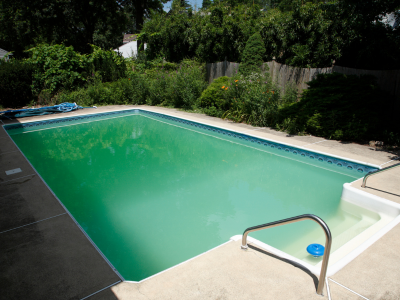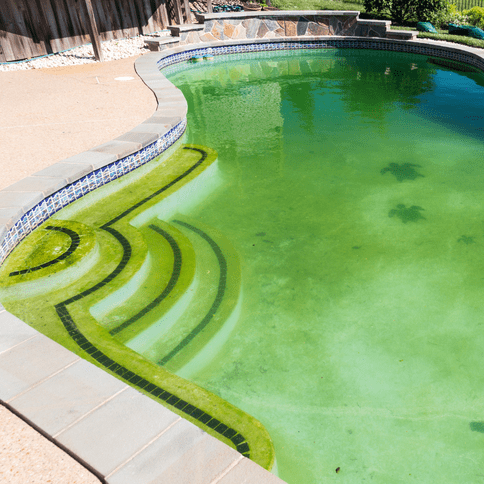There’s nothing better than jumping into a cool, refreshing pool on a hot day, especially when you’re swimming in clear pool water. But keeping your pool in that condition can feel tricky. Many pool owners believe the only way to make the water look great is by adding more chemicals. That’s not always true. There are safer, simpler ways to care for.
You can enjoy sparkling, healthy water with the proper habits and tools. If you’ve been looking for better ways to reduce harsh products, focus on natural pool maintenance and smarter cleaning routines. Whether you’re aiming for low-chemical pool care or hoping for long-term healthy pool water, there are simple solutions that work.
Why Pool Water Turns Cloudy or Murky
Cloudy water is a sign that something’s off. It may be due to excessive debris, inadequate filtration, or an imbalance in pool chemistry. It can even be caused by sunscreen, pollen, or excessive sun exposure in a single day. These things accumulate and impact the clarity of the pool water.
Some people respond by adding more chlorine or using a shock treatment, hoping it clears up the issue quickly. However, using too much can exacerbate the problem. It can throw off your pool water balance, create residue, and even irritate your skin and eyes.
The Role of Proper Filtration and Circulation
A clean pool starts with good flow and strong filtration. Your pump keeps water moving, while the filter catches small particles, such as dust and oil. If water isn’t circulating well, it becomes cloudy and can support the growth of bacteria.
Ensure your filter is clean and functioning correctly. Rinse or backwash it regularly. Additionally, run your pump for a sufficient amount of time each day. Most pools require approximately 8 hours of circulation, although this time can vary depending on the pool size and the season.
Good movement spreads chemicals evenly, prevents algae in corners, and keeps your pool water looking its best. When the water flows well, everything works better, even with fewer chemicals.
Smart Pool Maintenance Habits That Prevent Cloudy Water

Daily and weekly tasks help keep your pool looking nice without needing strong treatments. Skim the surface each day to remove leaves and bugs before they sink to the bottom. Brush the walls once or twice a week to stop algae from sticking. Vacuum weekly to remove dirt that settles at the bottom.
Clean the skimmer and pump baskets often. A clogged system struggles to keep water clean. Also, use a pool cover when the pool is not in use. This blocks out extra debris and reduces the frequency of cleaning.
These habits are part of natural pool care. They support clean water without depending on harsh solutions.
Balancing Pool Water Without Overdoing Chemicals
Testing your pool water regularly is key. Just because it looks okay doesn’t mean it is. Check levels like pH, alkalinity, and calcium hardness once a week. Balanced water protects your skin, eyes, and equipment.
Here are the ideal levels:
- pH: 7.2 to 7.6
- Alkalinity: 80 to 120 ppm
- Calcium hardness: 200 to 400 ppm
When these numbers are in range, your pool stays stable. That’s the core of pool water balance. If something’s off, adjust slowly. You don’t need to throw in a bunch of products to fix a minor issue.
Practicing low-chemical pool care is easier when you’re keeping an eye on the basics. You’ll use less, waste less, and avoid surprises.
Natural and Low-Chemical Alternatives to Conventional Pool Chemicals
If you want to swim in water that feels fresh but doesn’t burn your eyes, you don’t have to stick with traditional chlorine. There are safer systems that keep things clean with less effort.
One popular choice is a saltwater pool. It still uses chlorine, but at much lower levels. It feels softer and doesn’t have that strong smell. About 75% of new in-ground pools today use saltwater systems, up from just 12.5% in the early 2000s. That shift suggests that an increasing number of pool owners are opting for low-chemical options.
Other alternatives include ozone systems, UV systems, or mineral-based cleaners that use silver or copper to fight bacteria. You can also use enzyme products to help break down oils, sunscreen, and organic debris. These work in the background, so you don’t have to shock the pool as often.
Seasonal and Weather-Specific Tips
Weather changes can disrupt the balance of your pool. After heavy rain, water levels may rise and wash in dirt and leaves. Rainwater also affects pH levels. Hot weather can accelerate algae growth and increase the frequency of cleaning.
In rainy months, test your water more often. Skim the surface after every storm, and adjust the chemical levels if needed. During the summer, clean your filter more frequently and monitor the water’s appearance and texture.
Crowded pool days also impact water quality. After a party or a lot of use, it’s smart to do a quick clean and test the water the next morning.
Adjusting your care by season is essential for maintaining steady pool water clarity throughout the year.
When to Use Chemicals And How to Use Them Wisely
Sometimes chemicals are needed. That’s okay. The goal isn’t to avoid them altogether, but to use them wisely. If your water turns green or cloudy due to algae growth, or if your chlorine level drops too low, you may need to shock the pool.
But shocking should only be done when needed. Overdoing it causes more problems than it solves. Always read product labels and measure carefully. Don’t mix products, and use only the recommended amount.
Smart chemical use is part of safe pool maintenance. It’s about giving your pool what it needs, no more, no less.
Pro Tips for Ongoing Clear Pool Water
Once you get a rhythm, pool care gets easier. Set up a weekly checklist. Test water, clean filters, and give your pool a quick skim or brush. It only takes a few minutes a day.
Use a small notebook or a dedicated test-tracking app to record your tests. This helps you spot patterns and catch problems early. If something seems off, don’t guess, ask a pro, or bring a water sample to a pool store for help.
Even with minimal chlorine, you can maintain clear pool water by staying consistent.
Keep It Clean, Keep It Easy
You don’t need to overload your pool with chemicals to keep the water clear and safe. A little planning and steady care go a long way. With regular cleaning, smart testing, and good circulation, your pool can stay in top shape without the extra stress.
Think of it as balanced pool maintenance, not too much, not too little. The more you stay ahead of problems, the less you’ll need to fix later. Your pool stays clean, your water stays fresh, and your swimming days stay fun.
If your current setup makes it difficult to maintain a clean and balanced environment, it may be time for a custom upgrade. BC Pools designs and builds pools across Northwest Arkansas that are both beautiful and functional. A better system can make day-to-day care easier and help your water stay clean with less effort.
Contact us today to learn more or to request your free pool quote. You can also browse our gallery to view some of our completed projects and gain inspiration for your backyard.


